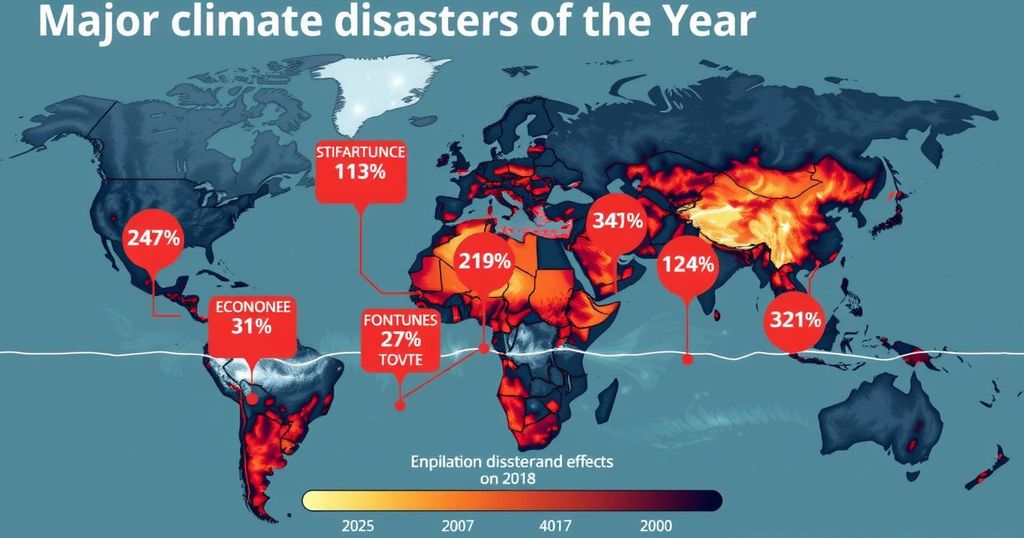In 2024, climate disasters caused $229 billion in damages and resulted in 2,000 deaths, with significant financial losses inflicted by Hurricanes Helene and Milton. The human toll included Typhoon Yagi’s 829 fatalities and widespread impacts from flooding and droughts. Climate experts link these events to human-induced climate change, prompting urgent calls for global action to curb emissions and support affected nations.
In 2024, climate disasters inflicted staggering damages amounting to $229 billion and resulted in the loss of 2,000 lives, underscoring the profound ramifications of global climate change. A significant portion of the financial toll was borne by the United States, where Hurricanes Helene and Milton alone accounted for over $75 billion in losses. Concurrently, severe weather events, including typhoons and flooding across Asia, Europe, and Latin America, further illustrated the pervasive threat posed by climate-related phenomena.
This year marked a historical peak in financial losses due to climate disasters, particularly as two hurricanes simultaneously yielded damages exceeding $50 billion each. These occurrences exemplify the escalating severity of extreme weather attributed to climate change. The leading ten disasters in 2024 each inflicted economic damages surpassing $4 billion, with floods in China and Brazil and Typhoon Yagi in Southeast Asia emphasizing the widespread impact on global economies.
Beyond economic consequences, the human toll of these climate disasters presents a distressing narrative. Typhoon Yagi emerged as the deadliest event, resulting in the tragic loss of at least 829 lives in Southeast Asia, while storm Boris in Europe resulted in 26 fatalities and $5 billion in damages. Additional incidents, including flooding in Brazil and Valencia, exacerbated the situation, leading to further loss of life and property. Less visible disasters, such as droughts in Africa and heatwaves in Bangladesh, also contributed significantly to food insecurity and health risks within vulnerable communities.
Climate scientists emphasize that many of these extreme events bear the undeniable mark of human-induced climate change. Dr. Mariam Zachariah from Imperial College London stated, “Most of these disasters bear the clear imprint of climate change.” Furthermore, organizations like Christian Aid caution that the actual economic impact of these disasters may be grossly underestimated due to the prevalence of uninsured individuals in developing countries. The ramifications of these climate events extend beyond financial losses, threatening the welfare of communities ill-equipped to cope with such adversities.
Patrick Watt, CEO of Christian Aid, has called for immediate action from world leaders, stating, “Human suffering caused by climate change reflects political decisions.” This assertion underscores the urgent need for reduced emissions and substantial support for the vulnerable nations most affected by climate change, despite their limited contributions to global emissions. The unfulfilled commitments regarding financial assistance for adaptation measures only intensify the threat faced by these developing countries.
The events of 2024 serve as a formidable reminder of the necessity to intensify efforts against climate change. Notably, the catastrophes orchestrated by Hurricanes Helene and Milton reveal the vulnerability of wealthy nations. Meanwhile, developing countries bear the brunt of climate impacts, hindered by their reduced capacity for recovery. The increasing frequency and intensity of climate disasters remain alarming indicators of the urgency for climate action, emphasizing the integral role of reducing dependency on fossil fuels and creating resilient infrastructures.
The insights from 2024’s climate disasters highlight the undeniable human and economic costs of climate change. Each disaster not only reflects the consequences of current decisions but also underscores the imperative to take proactive measures before these impacts become permanent. Investing in climate resilience and aggressive emissions reduction strategies is not solely a matter of risk mitigation but also an essential endeavor for protecting livelihoods and economies. As the world faces the realities of climate change, a renewed commitment to climate action in 2025 is essential to foster collective efforts for a sustainable future.
The article discusses the severe economic and human impact of climate disasters faced in 2024, drawing attention to the alarming trends in extreme weather events attributable to climate change. It highlights record financial losses and casualties caused by hurricanes, typhoons, and floods across various regions, emphasizing the disproportionate vulnerability of developing nations and the urgent need for global proactive measures to address climate change.
In summation, the year 2024 stands as a stark illustration of the dire consequences arising from climate change, manifested through unprecedented economic losses and human fatalities due to natural disasters. The escalating frequency and severity of these events necessitate an urgent call to action among global leaders, to uphold their commitments to mitigate climate impacts, support vulnerable communities, and invest in sustainable solutions aimed at fostering resilience against future climate challenges.
Original Source: www.drivingeco.com






